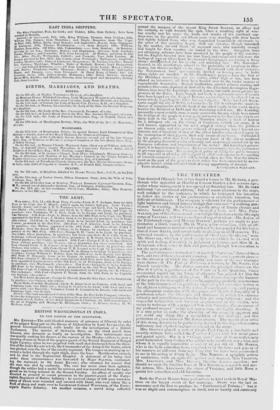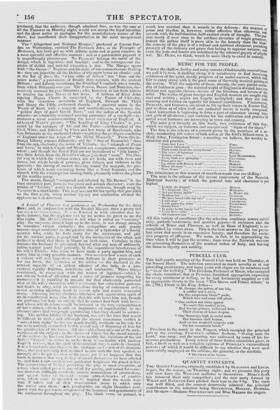Both the Patent Houses have p tribute in kind to
their Royal Mis- tress on the happy event of her marriage. Drury was the last to announce and the first to produce its " Emblematical Tribute ;" but it was so slight and commonplace iu itself, and so hastily and carelessly produced, that the audierce, though admitted free, as was the case at all the Theatres on Monday night, would not accept the loyal intention and the short notice as apologies for the unsatisfactory nature of the show, but manifested their disapprobation in the most unequivocal manner.
The " Allegorical and National Masque," produced at Covent Gar- den on Wednesday, entitled-The Fortunate Isles, or the Triumphs of Britannia, has been got up with infinite pains and at great expense, in a most splendid and effective manner ; and as a pantomimic pageant it is magnificently picturesque. To PLAsCIId belongs the merit of the design, which is ingenious and fanciful ; and to the management the praise of skilful and tasteful execution is due. The Masque opens with "the Ocean :" Neptune and his train of sea-monsters come floating in ; they are joined by all the Deities of Olympus borne on clouds ; and, at the fiat of Jove, the "white cliffs of Albion" rise "from out the azure main ;" a procession of Druids then appears, with the ancient Britons ; and Liberty transforms the Druidical Cromlech into a temple, from which Britannia emerges. The Saxons, Danes, and Normans, suc- cessively contend for poor Britannia ; who, however, at last finds leisure to receive the nine Muses at her levee. A tableau of King John signing Magna Charts is succeeded I,y the Palace of Chivslry. with the victorious monarchs of England, Edward the Third and Henry the Fifth, enthroned therein. A pastoral scene in the Weald of Kent, with a maypole and morris-dancers, represents the " golden days of good Queen Bess ; " and the defeat of the Spanish armada—an admirably-managed moving panorama of a sea-fight—in- troduces a scene commemorating the naval victories of England. A tableau of WEST'S picture, "The Landing of King Charles," is pre- ceded by the entrance of At6 and the Furies—emblematical of the Civil Wars; and followed by Circe and her troop. of Bacchanals, who lure Britannia to the enchanted chair—typifying the profligate condition of England tinder the reign of " the Merry 31mmrch." From this le- thargy Liberty arouses Britannia ; and the " Star of Brunswick" rises from the sea, disclosing the name of Victoria : the " triumph of Peace and Love," in which Cupid and Hymen are conspicuous, concludes the whole ; and though the Royal Pair are not introduced to "join hands," two little Ariels from the lierald's College juin their " arms." The libe- ral way in which the various scenes are set forth, not with twos and threes, but whole bands of persons, gives fulness and richness to the spectacle : the throng of rustics dancing round the maypole, the gar- lands of which come streaming down like a floral fountain, and the church with the congregation issuing forth, pleasantly relieve the glitter of the warlike pomp.
The music, though " composed and selected by Mr. Basnon," is the least attractive part, from its too grave and solemn character : even the strains of "Liberty" could not inspirit the audience, though sung by VESTRIS in a short kirtle. This luny account for the apathy that prevailed on the first Mahn when neither loyalty nor admiration elicited the applause so well deserved.



























 Previous page
Previous page